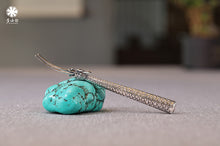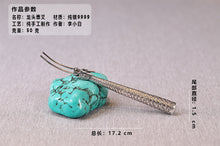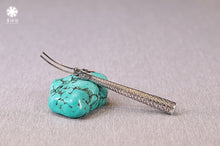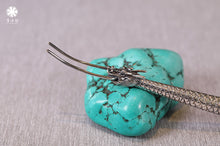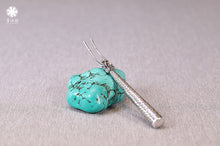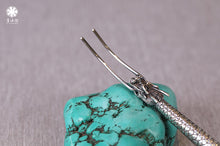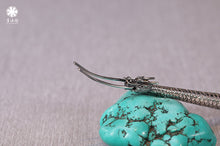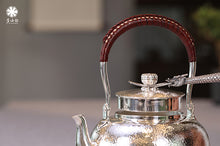
The stove is filled with thick mist, and the surging and rolling water is heating up inside the kettle. On a cold winter day, brewing tea and sipping it while playing with an iron kettle in a room filled with a delicate fragrance is a pleasant moment that every tea lover yearns for. When boiling water for making tea, the knob cover of a cast-iron kettle is often scalding hot. However, with a kettle clip, one can easily lift the kettle cover without worrying about getting burned by the high temperature.
Although the kettle clip is a niche item, it is an essential tool for tea affairs. What tea lovers look for in a good kettle clip are reliability and sturdiness, convenience in picking up the kettle cover, durability, and applicability to various boiling kettles. If it also feels comfortable in the hand and has a textured appearance, that would definitely be a plus. The Tongxin She Teahouse finally found such a "Li Xiaobai 9999 Pure Silver Kettle Clip" that meets all of their criteria. It weighs 50 grams and has a total length of 17 centimeters.
Dali's Heqing County is one of the outstanding representatives in the Yunnan silver culture. According to the ancient book "Heqing County Annals", silver forging in Heqing began in the Ming Dynasty and became the handicraft center of copper and silverware in Yunnan during the Nanzhao period of the Tang Dynasty, with a history of more than 1,200 years. Brothers Li Fuming and Li Fucai from Heqing are representatives among many silver forgers. Their grandfather was a well-known old silver smith. The two brothers, who had already achieved certain success in their careers outside, gave up their honors and returned to their hometown because they always had the silver forging craft, which had been passed down for generations, on their minds. They became addicted to this handicraft of hammering. Since the elder brother had liked Duke Huan of Qi, known as "Gongzi Xiaobai", since childhood and they were of the Li surname, they named the silver kettles they forged "Li Xiaobai Silver Kettles".
Li Fuming was rated as a county-level intangible cultural heritage inheritor of Heqing silver jewelry craftsmanship in 2016. The Li Xiaobai Silver Kettles have broken the monopoly of Japanese silver kettles and become highly sought-after silverware in the collection circle. At present, many of the works created by Li Fuming have more than 10 national design patents, and some have been collected in the Dali Bai Autonomous Prefecture Intangible Cultural Heritage Museum.
The Li Xiaobai Silver Kettle Workshop mainly focuses on making "9999 Pure Silver Tea Sets". The physical structure of the silver material is changed through pure manual hammering. The originally soft silver sheets become thin, light, hard, and textured. Each Li Xiaobai Silver Kettle is hammered from a single piece of 9999 pure silver sheet without welding. With more than 400,000 hammerings and nearly 100 temperings, the hardness of the silver sheet is increased, and the finally formed silver kettle is thin and light but hard.
Each hammer blow lays the foundation for its use, and each carving stroke creates value for its exquisiteness. Silverware should not only be handicrafts but also combine usability and beauty to add charm to a beautiful life. The kettle body is repeatedly polished, and then, accompanied by the inspiration and design of dozens of arts and crafts masters, various patterns are presented on the kettle, with strong manual traces and unique craftsmanship. The beauty of Chinese silverware lies in the essence of Chinese culture that is implicit and unassuming.
Silver was exclusively used by the imperial family in ancient times and was not accessible to ordinary people. Silver tea-making utensils have been highly praised by celebrities and refined scholars throughout the ages, and there are many wonderful aspects. "Compendium of Materia Medica" also states that "Silver can soothe the five internal organs, calm the mind, stop palpitations, and expel pathogenic factors."
Each product made of silver material has its unique significance - noble, beautiful, healthy, and auspicious, becoming a carrier for inheriting Eastern culture. How can a refined tea affair be without a good kettle? Water is the mother of tea, and utensils are the father of tea. The balance between water and utensils may well be represented by the silver kettle.
In 2014, the State Council and the Ministry of Culture awarded Li Xiaobai the title of "National Intangible Cultural Heritage". After years of precipitation and development, Li Xiaobai Silver Kettles have become the most well-known silver kettle brand in China, winning 47 national and provincial honors such as the "2019 Annual China (Yunnan) Most Influential Brand Award", applying for 26 national patents, and becoming a representative of high-end handmade silverware production in China.
The Li Xiaobai Silver Kettles not only attach great importance to the inheritance and promotion of traditional handicrafts but also focus on innovation in craftsmanship and art design. The craftsmen of Li Xiaobai have strict requirements for their skills, striving for perfection and being meticulous in every detail. The craftsmanship spirit within is as pure and shining as silver. Appreciating a silver kettle is not easy because a silver kettle is like a mountain, a river, a scene of auspiciousness, representing the wisdom and vision of the craftsman.












